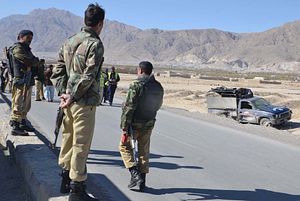Pakistan has deployed hundreds of troops to secure China’s $46 billion investment in the strategically and economically important port of Gwadar, with more expected to follow. Jafer Khan, a regional police officer in Gwadar stated, “Soon we’ll start hiring 700-800 police to be part of a separate security unit dedicated to Chinese security, and at a later stage a new security division would be formed.”
Pakistan is leaving nothing to chance to secure the China-Pakistan Economic Corridor (CPEC), a link vital to Pakistan’s long-term prosperity, and a strategic hub for China to check Indian naval development being a mere 72 km from the rival port of Chabahar. Gwadar serves as China’s link to the Gulf, allowing China to project soft power and military strength in the region, a direct challenge to U.S. primacy in the Middle East.
These developments were underscored by a recent visit of Chinese Admiral Sun Jianguo, deputy chief of staff of the People’s Liberation Army, to Iran, in which he stated “The aim of this delegation’s visit is to further promote friendship, deepen cooperation and exchange views with Iran on bilateral military ties and issues of mutual concern.”
China has been rapidly expanding its influence in a region once only dominated by the U.S.; as U.S. involvement in the Middle East slowly evaporates, China is moving in to fill the power vacuum. In December, Chinese Foreign Minister Wang Yi announced plans for construction of a Navy base in Djibouti, highlighting growing signs of an increased economic and military presence in the Middle East. Djibouti is strategically positioned to provide access to the Red Sea and Suez Canal, an important economic channel that currently houses a number of foreign forces to include Japan, U.S. and French military forces. The development of Gwadar and Djibouti represents an expansion of China’s strategic vision, securing China’s strategic and vital interests abroad.
In a country rife with instability, Pakistan is pulling out all the stops to ensure the vital corridor that stretches from the Chinese city of Kashgar to the port of Gwadar in Pakistan, which also rests in the volatile Pakistani province of Baluchistan, is protected. In April 2015, Pakistan announced the creation of a special security division comprised of roughly 10,000 troops dedicated to the protection of Chinese engineers, project directors, experts and workers employed on various Chinese funded projects across Pakistan.
Located in the restive province of Baluchistan, securing CPEC and strategic port is no easy task. Baluch separatist groups are opposed to the development of the port, viewing it as an occupation “We consider the China-Pakistan Economic Corridor as … an occupation of Baluch territory,” said rebel spokesman Miran Baluch, a member of the Baluchistan Liberation Front (BLF). In April, the BLF launched its most violent attack since 2006 that killed 20 construction workers, including a well-coordinated attack on an airport servicing Gwadar.
Pakistan views protection of CPEC as vital, given that the project expected to net billions for Pakistan, a much needed injection of capital into Pakistan’s sluggish economy.

































